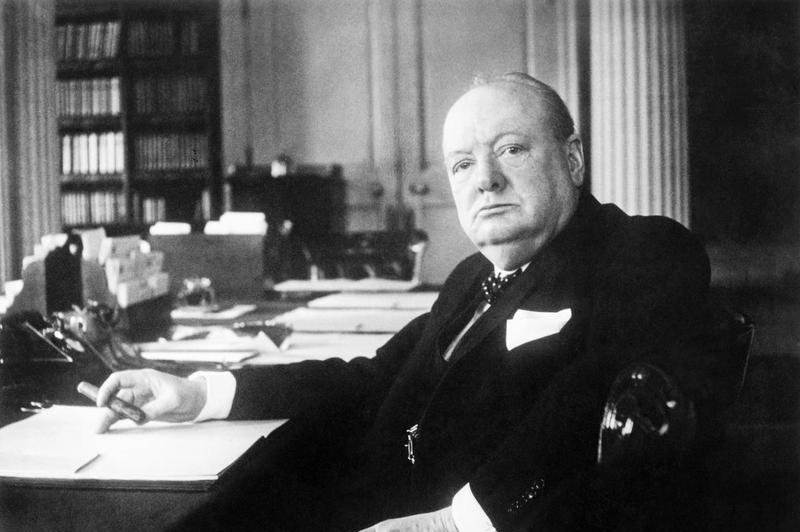Winston Churchill resigned as prime minister July 26, 1945, when his Labor party was voted out of power. File Photo courtesy Cecil Beaton/Imperial War Museums
LONDON (U.P.) -- Prime Minister Winston Churchill and his Conservative party went down to defeat today in the British election and the Labor party was expected to form a new government.
Turning their backs on the men who led their nation through the darkest perils of the war, British voters overwhelmingly repudiated his Conservative party and elected to the House of Commons a clear and absolute majority of Labor party members.
Under British custom, Churchill's resignation and the formation of a new cabinet headed by Labor Party Leader Maj. Clement Attlee was merely a formality.
An official tabulation of votes at 2 p.m. (8 a.m. CWT) wrote the end of Churchill's leadership of Britain.
It disclosed that opposition parties had elected 331 members against 166 for government supporters. Of the opposition total 311 were Labor party members and it was plain that the Laborites had elected more than an absolute majority in the 640-member House of Commons.
Labor has 352 seats
A tabulation at 2:40 p.m. (8:40 a.m.) gave opposition parties 375 seats, including 352 Labor party seats. The government had 190 seats.
It was the first time the Labor party had ever won a clear majority of the House of Commons although it formed a coalition under Ramsay MacDonald in the '20s.
The defeat of Churchill and the Conservatives was crushing. Churchill himself was returned to parliament as was Foreign Secretary Anthony Eden. But they were almost the only holdovers among the Conservatives who have held office through the 10 years since the last general election in 1935.
The mood of the electorate was clearly shown when the unknown farmer, Alexander Hancock, who ran against Churchill in London suburban district, managed to roll up a total of more than 10,000 votes, only 17,000 fewer than were cast for Churchill.
Alone among the prominent Conservatives to come through the election with his support little damaged was Eden who polled 60 percent of his electorate.
Churchill's associates and colleagues toppled around him like tenpins while the Labor leaders rode through with impressive majorities.
Among those who went out of parliament in the sweep was Brendan Bracken, Churchill's closest government associate, and information minister until recent weeks when he became first lord of the admiralty.
Others who fell were M.H. MacMillan, secretary of state for air; Brig. Gen. Sir Edward Spears, British minister in the Levant states; Leslie Hore-Belisha, one-time war minister; Leopold S. Amery, secretary of state for India; Sir James Grigg, war minister; Geoffrey Lloyd, minister of information; Maj. Randolph Churchill, the prime minister's son; Duncan Sandys reconstruction minister and son-in-law of the prime minister; Richard K. Law, minister of education; Sir William Beveridge, author of the famous Beveridge plan; Ralph Assheton, chairman of the Conservative party; William Astor, son of Lady Astor; Sir Richard Acland, leader of the leftist Commonwealth party; and Ernest Brown, liberal National and minister of aircraft production.
That the Churchill bid to stay at Britain's helm during the critical days of the end of the Pacific war and the beginning of reconstruction was in danger had been foreshadowed before the end of the brief election campaign.
Made a clean sweep
But that the Labor party would make a sweep had not even been expected by the most optimistic Laborites.
All political observers had agreed that it was the most difficult election to forecast in a generation since nearly a third of the voters were going to the polls for the first time.
Army sentiment, it was known, had swung sharply to the left and its extent had been revealed in Berlin where the troops cheered Attlee rather than Churchill during an inspection of Field Marshal Sir Bernard Montgomery's "Desert Rats."
As the electoral torrent poured in, sweeping his friends and associates out of office, Churchill, grim and doughty as he ever had been in the critical days of the blitz remained closeted in 10 Downing street.
Outside the dingy little house which is the office and residence of British prime ministers a little crowd stood, huddling close to the building to keep out of the drizzling London rain.
Two bobbies were on duty. They told the crowd genially that they had not seen Churchill all day and that there was no chance that he would make a personal appearance. But the crowd did not budge.
The defeat suffered by Churchill and his caretaker government was one of the worst in British political history. Eleven of the 15 members of the cabinet were voted out of office. In addition to Churchill and Eden, Colonies Minister Oliver Stanley and Production Minister Oliver Lyttelton survived.
The fate of Col. J.J. Llewellin, minister of food, and of Sir John Anderson, chancellor of the exchequer, still was uncertain.
One of the closest contests involved Sir Archibald Sinclair, leader of the Liberal party. The returns in his district showed: E.L.G. Dower, Conservative, 5,564; M. McInnes, Labor, 5.558; and Sinclair, 5,503. A recount was likely.
The electoral results stunned the city -- London's equivalent of Wall street. Trading on the stock exchange was at a standstill. Brokers had anticipated a narrow Churchill victory but were not prepared for a sweep by the Labor party whose program is frankly socialistic and which demands the nationalization of some of Britain's key industries.
The Labor sweep carried not only its strongholds in the Welsh mining country and the industrial cities of the Midlands but also the great residential suburbs of London and the rural areas which have been Conservative for generations. The Conservative victories, generally, occurred in districts where the opposition was split.















